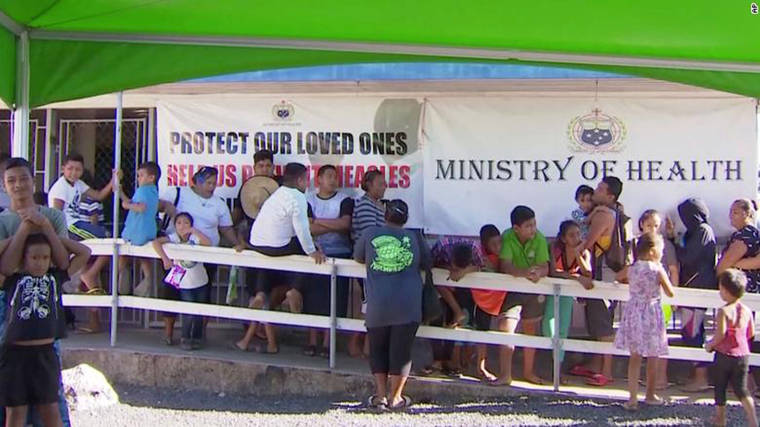APIA, Samoa — An emergency medical team from Hawaii, along with Samoan volunteers and aid workers from other countries, immunized more than 20,000 residents on the first day of a mandatory vaccination campaign.
“We expect to press right up to our goal of 50,000 by the end of our mission,” said Hawaii Lt. Gov. Josh Green, who assembled a team of 76 people to help the distressed independent nation. Samoa shut down operations for 48 hours and declared a state of emergency following the deaths of more than 60 people from the measles, which has infected more than 4,000.
The medical mission was especially meaningful for Lauline Keller, a 45-year-old cardiac nurse at The Queen’s Medical Center, who was born in American Samoa and went door to door through villages searching for those who were still susceptible to the disease.
“It’s very personal for me and it’s dear to my heart,” she said. “To be able to help the people of my own country, I mean, it’s an honor and it’s a blessing. Coming from Hawaii, we are so privileged with health care, and to be in this environment and to help …. This is a big cry for help, and I’m so happy and grateful for the state of Hawaii to respond the way they did.”
Nancy Sullivan, also a Queen’s nurse, said the experience was “absolutely amazing.” Both came to Samoa at the drop of a hat after the call went out for emergency volunteers 24 hours before.
“It’s been such a state of emergency. How the government shut down, everything shut down, and just the extent of the devastation,” she said.
Thirteen-year-old Daniel Filipo said he felt safe after getting immunized by the nurses along with his two sisters, 7-year-old Rosita and Telesia, 5.
“It can protect me from this horrible disease,” he said. “(The measles epidemic is) very sad — sad for our family, our villages and especially our country.”
Leoli Sanele, 60, a chief of the village of Leulumoega, said it was about time the government had launched an immunization campaign to stop the preventable disease from spreading.
“They have to do it earlier. Don’t just wait long like what’s been (happening). Most of the parents, they cry because their kids have passed away,” he said. “I blame the parents and also the health departments. They have to stand together. The more information from the health departments can convince the parents to do better for their children. If the parents don’t come to the hospital, you have to go to the families. Measles and all those diseases, they’re spread around the country now.”
Evelyn Laulu encouraged her 17-year-old son, Ken, to get another injection of the measles vaccine. He already had the infectious disease in 2010, but she wanted to make sure he was protected.
“I want him to be safe. I’m scared of all these crisis and all these measles outbreak. So many people are dying at the hospital,” she said, adding that her 7-year-old daughter, Leute, recently spent five days in the hospital after contracting the disease. “When I took her in, she wasn’t eating, she was vomiting and her eyes were red and she had high fever. I saw a lot of patients — young kids. It’s very hard to see all these kids crying and losing (their lives). I had measles when I was young; it was something that you could cure. Before, no one considered it a deadly disease, because we had it.”



